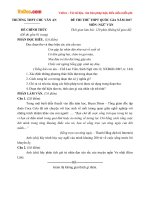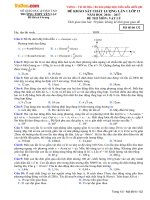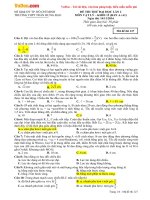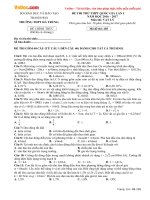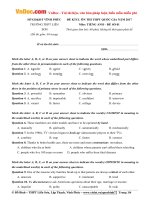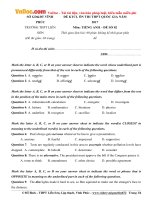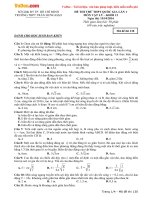Đề thi thử THPT Quốc Gia năm 2017 môn Tiếng Anh trường THPT Yên Lạc mã 757 | Đề thi đại học, Tiếng Anh - Ôn Luyện
Bạn đang xem bản rút gọn của tài liệu. Xem và tải ngay bản đầy đủ của tài liệu tại đây (142.73 KB, 6 trang )
<span class='text_page_counter'>(1)</span><div class='page_container' data-page=1>
SỞ GD – ĐT VĨNH PHÚC
<b>TRƯỜNG THPT YÊN LẠC</b>
(Đề thi có 04 trang)
<b>ĐỀ KSCL ÔN THI THPT QUỐC GIA LẦN I – LỚP 12</b>
<b>NĂM HỌC 2016-2017</b>
<b>ĐỀ THI MÔN: TIẾNG ANH</b>
<i>Thời gian làm bài: 60 phút, không kể thời gian phát đề</i>
<b>Mã đề thi 757</b>
Name:... Index number: ...
<i><b>Read the following passage and choose A, B, C, or D to indicate the correct answer to each of the questions. </b></i>
<b>Shania Twain</b>
Twain’s career actually began more out of necessity than raw ambition. Her parents divorced when she
was ___(1)___, and she rarely saw her father. Her mom and stepfather, to whom she grew close, often
couldn’t make enough to get by, ___(2)___ Twain started singing in bars to make extra money when she
was just eight years old.
She recalls her mother waking her up at all hours to get up and perform. ___(3)___, when she was 21,
her mother and stepfather were killed in a head-on car accident with a logging truck on the highway.
Twain put her career on hold to step in and ___(4)___ care of her three younger siblings (who were in
their teens at the time). She sang in resorts and put off going after big-time stardom until her sister and
brothers were old enough to care for themselves. Only ___(5)___ her youngest brother graduated high
school did she feel OK heading down to Nashville to pursue her career.
<b>Question 1: A. twice</b> <b>B. two</b> <b>C. second</b> <b>D. double </b>
<b>Question 2: A. so</b> <b>B. but</b> <b>C. and</b> <b>D. although </b>
<i><b>Question 3: </b></i><b>A. Hopefully</b> <b>B. Sadly</b> <b>C. Fortunately</b> <b>D. Happily</b>
<b>Question 4: A. ø</b> <b>B. have</b> <b>C. take</b> <b>D. make</b>
<b>Question 5: A. if</b> <b>B. by</b> <b>C. though</b> <b>D. once</b>
<i><b>Complete the sentences below by choosing A, B, C, or D. </b></i>
<b>Question 6: It’s too salty for us ______. We have to add some water more.</b>
<b>A. having</b> <b>B. not to have</b> <b>C. not having</b> <b>D. to have</b>
<b>Question</b><i><b> 7: Long is looking at Linh’s mark 10 in her paper and said to her.</b></i>
Long: “_______” - Linh: “Thank you. That’s a nice compliment.”
<b>A. If only I had such a good mark</b> <b>B. No matter how good the mark is!</b>
<b>C. You are so skilful!</b> <b>D. What a mark 10!</b>
<b>Question 8: There _______ right at once when the accident happened.</b>
<b>A. came the police</b> <b>B. do the police come</b> <b>C. comes the police</b> <b>D. come the police</b>
<b>Question 9: He said he hadn’t finished his letter yet ________.</b>
<b>A. by now</b> <b>B. until then</b> <b>C. until now</b> <b>D. so far</b>
<b>Question 10: _______ is a pulling force to attract rural workers to the crowded cities because of high-paid</b>
stipends or salaries.
<b>A. Urbanize</b> <b>B. Urbanizedly</b> <b>C. Urbanization</b> <b>D. Urban</b>
<b>Question 11: _______ the bad weather, their plan still went ahead.</b>
<b>A. In terms of</b> <b>B. Regarded as</b> <b>C. In spite of</b> <b>D. Because of</b>
<b>Câu 12: Hard jobs affected by weather are a pushing ________ to lead young farmers to the cities.</b>
<b>A. factor</b> <b>B. result</b> <b>C. substance</b> <b>D. matter</b>
<b>Question 13: Changing our lifestyle and limiting our exploitation of natural resources _______ the only</b>
way to ensure a better future for our children, and our children’s children.
<b>A. was</b> <b>B. have been</b> <b>C. are</b> <b>D. were</b>
</div>
<span class='text_page_counter'>(2)</span><div class='page_container' data-page=2>
<b>A. being acquainted</b> <b>B. acquainting</b> <b>C. be acquainted</b> <b>D. acquaintance</b>
<b>Question 15: What do we call that _______ animal? - We call it an elephant.</b>
<b>A. long-nosed</b> <b>B. nose long</b> <b>C. long nose</b> <b>D. nose length</b>
<b>Question 16: We’ll send you a postcard _______ we arrive at the destination.</b>
<b>A. as if</b> <b>B. although</b> <b>C. as soon as</b> <b>D. unless</b>
<b>Question</b><i><b> 17: Hoa is asking Hai, who is sitting at a corner of the room, seeming too shy.</b></i>
Hoa: “Why aren’t you taking part in our activities? ________” - Hai: “Yes. I can. Certainly.”
<b>A. Can I help you?</b> <b>B. Shall I take your hat off?</b>
<b>C. Could you please show me how to get to the nearest post office?</b>
<b>D. Can you help me with these decorations?</b>
<b>Question 18: You should do everything that is given to you _______; or else, you will get nothing.</b>
<b>A. irresponsible</b> <b>B. responsibly</b> <b>C. responsibility</b> <b>D. responsible</b>
<b>Question 19: It’s the expert’s recommendation that every child and office worker ______ with their back,</b>
neck, and head in the straight position.
<b>A. sit</b> <b>B. has sat</b> <b>C. sat</b> <b>D. sits</b>
<b>Question 20: According to Do Tan Long, an official of the Steering Center of Urban Flood Control</b>
Program in Ho Chi Minh City, the rain could be “the most extreme downpour” since ______ beginning of
the rainy season.
<b>A. the</b> <b>B. a</b> <b>C. an</b> <b>D. ø</b>
<b>Question 21: They ________ their service up to now.</b>
<b>A. don’t do</b> <b>B. haven’t done</b> <b>C. aren’t doing</b> <b>D. didn’t do</b>
<b>Question</b><i><b> 22: Choose the option which has the OPPOSITE meaning to the underlined.</b></i>
<b>The disadvantaged child went up stairs with difficulty.</b>
<b>A. with precision</b> <b>B. with ease</b> <b>C. at will</b> <b>D. at random</b>
<b>Question</b><i><b> 23: Choose the option which has the OPPOSITE meaning to the underlined.</b></i>
<b>The poor blood circulation has sometimes made her exhausted.</b>
<b>A. fatigued</b> <b>B. refreshed</b> <b>C. bothersome</b> <b>D. fulfilled</b>
<b>Question</b><i><b> 24: Choose the option which has the CLOSEST meaning to the underlined.</b></i>
<b>The government has rejected the project of improving the service system because of its white elephant</b>
cost.
<b>A. denied</b> <b>B. proposed</b> <b>C. discarded</b> <b>D. selected</b>
<b>Question</b><i><b> 25: Choose the option which has the CLOSEST meaning to the underlined.</b></i>
<b>The people are doing their duties with precision.</b>
<b>A. plans</b> <b>B. achievements</b> <b>C. responsibilities</b> <b>D. expectations</b>
<b>Question</b><i><b> 26: Choose the word whose underlined letter(s) is/ are pronounced differently from the</b></i>
<i><b>others.</b></i>
<b>A. rushed</b> <b>B. released</b> <b>C. advised</b> <b>D. increased</b>
<b>Question</b><i><b> 27: Choose the word whose underlined letter(s) is/ are pronounced differently from the</b></i>
<i><b>others.</b></i>
<b>A. graduated</b> <b>B. pretended</b> <b>C. estimated</b> <b>D. killed</b>
<b>Question</b><i><b> 28: Choose the word whose stress pattern is different from the others.</b></i>
<b>A. discussion</b> <b>B. stimulate</b> <b>C. attractive</b> <b>D. non-verbal</b>
<b>Question</b><i><b> 29: Choose the word whose stress pattern is different from the others.</b></i>
<b>A. physics</b> <b>B. perform</b> <b>C. differ</b> <b>D. gesture</b>
<i><b>Find the underlined words or phrases which is incorrect.</b></i>
<b>Question 30: The gifts were given the flood victims timely with the help of a helicopter.</b>
<b>A. timely</b> <b>B. a</b> <b>C. The</b> <b>D. given</b>
<b>Question</b><i><b> 31: The volunteer group members are helpful, exciting, and creativity.</b></i>
<b>A. are</b> <b>B. exciting</b> <b>C. creativity</b> <b>D. volunteer</b>
</div>
<span class='text_page_counter'>(3)</span><div class='page_container' data-page=3>
<b>A. next Sunday</b> <b>B. to</b> <b>C. are</b> <b>D. for</b>
<i><b>Rewriting the sentences in another way so that they have the same meaning as the given above.</b></i>
<b>Question</b><i><b> 33: Lan has never attended such an exciting live show before.</b></i>
<b>A. This is the first time Lan has ever attended such an exciting live show.</b>
<b>B. Lan has attended such an exciting live show before this time.</b>
<b>C. Lan attended such an exciting live show once.</b>
<b>D. This was the first time Lan has ever attended such an exciting live show.</b>
<b>Question</b><i><b> 34: There was a sharp rise in the price of petrolimex last month.</b></i>
<b>A. The price of petrolimex went down sharply last month.</b>
<b>B. The price of petrolimex made the consumers surprised last month.</b>
<b>C. The price of petrolimex went up sharply last month.</b>
<b>D. The price of petrolimex stayed the same last month.</b>
<b>Question</b><i><b> 35: “Please take this medicine at regular time.” The doctor told him.</b></i>
<b>A. The doctor asked him to take this medicine at regular time.</b>
<b>B. The doctor suggested he take this medicine at regular time.</b>
<b>C. The doctor advised him to take this medicine at regular time.</b>
<b>D. The doctor offered him to take this medicine at regular time.</b>
<b>Read the passage carefully and choose the correct answer.</b>
Movements and gestures by the hands, arms, legs, and other parts' of the body and face are the
most pervasive types of nonverbal messages and the most difficult to control. It is estimated that there are
<i>over 200.000 physical signs capable of stimulating meaning in another person. For example, there are 23</i>
distinct eyebrow movements, each capable of stimulating a different meaning.
Humans express attitudes toward themselves and vividly through body movements and postures.
Body movements express true messages about feelings that cannot be masked. Because such avenues of
communication are visual, they travel much farther than spoken words and are unaffected by the presence
of noise that interrupt, or cancels out speech.
People communicate by the way they walk, stand, and sit. We tend to be more relaxed with
friends or when addressing those of lower status. Body orientation also indicates status or liking of the
other individual. More direct orientation is related to a more positive attitude.
Body movements and postures alone have no exact meaning, but they can greatly support or
reject the spoken word. If these two means of communication are dichotomized and contradict each other,
some result will be a disordered image and most often the nonverbal will dominate.
<b>Question 36: Which part of body is NOT used to send body message?</b>
<b>A. stomachs</b> <b>B. legs</b> <b>C. hands</b> <b>D. faces</b>
<b>Question 37: Body communication is ________.</b>
<b>A. uncommon</b> <b>B. verbal</b> <b>C. very few</b> <b>D. visual</b>
<b>Question 38: Nonverbal communication ________.</b>
<b>A. may be interrupted by noise</b> <b>B. dominates words</b>
<b>C. has no relation to verbal communication</b> <b>D. is less common than verbal communication</b>
<b>Question 39: According to the text, body movements cannot express ________.</b>
<b>A. desires</b> <b>B. feelings</b> <b>C. attitudes</b> <b>D. status</b>
<b>Question 40: Face gestures ________.</b>
<b>A. do not include eye brow moments</b> <b>B. cannot express our feelings</b>
<b>C. are the most difficult to control</b> <b>D. can help us control our feelings</b>
<i><b>Read the text and answer the questions given by choosing one numbered options.</b></i>
</div>
<span class='text_page_counter'>(4)</span><div class='page_container' data-page=4>
factor could reverse the effects of memory loss caused by Alzheimer's. Using a group of rats with
impaired memory, the scientists gave half of the rats doses of nerve growth factor while giving the other
half a blood protein as a placebo, thus creating a control group. At the end of the four-week test, the rats
given the nerve growth factor performed equally to rats with normal memory abilities. While the
<b>experiments do not show that nerve growth factor can stop the general process of deterioration caused by</b>
<b>Alzheimer's, they do show potential as a means to slowing the process significantly.</b>
Placebo: thuốc trấn an
<b>Question 41: The word "impairs" is most similar to which of the following?</b>
<b>A. destroys</b> <b>B. enhances</b> <b>C. diminishes</b> <b>D. affects</b>
<b>Question 42: According to the passage, where is nerve growth factor produced in the body?</b>
<b>A. in nerve cells in the spinal column.</b> <b>B. in the pituitary gland.</b>
<b>C. in red blood cells in the circulatory system.</b> <b>D. in nerve cells in the brain.</b>
<b>Question 43: Which of the following could best replace the word "potential"?</b>
<b>A. capability</b> <b>B. creativity</b> <b>C. dependability</b> <b>D. possibility</b>
<b>Question 44: With what topic is this passage mainly concerned?</b>
<b>A. impaired memory of patients</b> <b>B. the use of rats as experimental subjects</b>
<b>C. nerve growth factor as a cure for Alzheimer's D. cures for Alzheimer's disease</b>
<b>Question 45: Which of the following can be inferred from the passage?</b>
<b>A. Alzheimer's disease is deadly.</b>
<b>B. More work needs to be done to understand the effects of nerve growth factor.</b>
<b>C. Though unsuccessful, the experiments did show some benefits derived from nerve growth factor.</b>
<b>D. The experiments did not show any significant benefits from nerve growth factor.</b>
<b>Question 46: The relationship between nerve growth factor and a protein is similar to the relationship</b>
between Alzheimer's and
<b>A. forgetfulness</b> <b>B. a cancer</b> <b>C. a cure</b> <b>D. a disease</b>
<b>Question 47: Which of the following is closest in meaning to the word "region" as used in line 5?</b>
<b>A. plain</b> <b>B. expanse</b> <b>C. orbit</b> <b>D. vicinity</b>
<b>Question 48: Which of the following could best replace the word "significantly" in line 17?</b>
<b>A. tirelessly</b> <b>B. suggestively</b> <b>C. knowingly</b> <b>D. considerably</b>
<b>Question 49: Which of the following is closest in meaning to the word "doses"?</b>
<b>A. measures</b> <b>B. injections</b> <b>C. stipends</b> <b>D. pieces</b>
<b>Question 50: The passage most closely resembles which of the following patterns of organization?</b>
<b>A. causes and effects</b> <b>B. statement and illustration</b>
<b>C. chronological order</b> <b>D. alphabetical order</b>
--- HẾT
</div>
<span class='text_page_counter'>(5)</span><div class='page_container' data-page=5>
<b>TRƯỜNG THPT YÊN LẠC </b>
<b>ĐÁP ÁN TIẾNG ANH - ĐỀ THI THỬ THPT QUỐC GIA LẦN 1</b>
<b>NĂM HỌC 2016 – 2017</b>
<b>Mã đề</b> <b>Câu</b> <b>Đáp án</b>
757 1 B
757 2 A
757 3 B
757 4 C
757 5 D
757 6 D
757 7 A
757 8 A
757 9 B
757 10 C
757 11 C
757 12 A
757 13 C
757 14 B
757 15 A
757 16 C
757 17 D
757 18 B
757 19 A
757 20 A
757 21 B
757 22 B
757 23 B
757 24 C
757 25 C
757 26 C
757 27 D
757 28 B
757 29 B
757 30 D
757 31 C
757 32 D
757 33 A
757 34 C
757 35 A
757 36 A
757 37 D
757 38 B
757 39 A
757 40 C
757 41 C
</div>
<span class='text_page_counter'>(6)</span><div class='page_container' data-page=6>
757 43 D
757 44 C
757 45 B
757 46 D
757 47 D
757 48 D
757 49 A
</div>
<!--links-->


